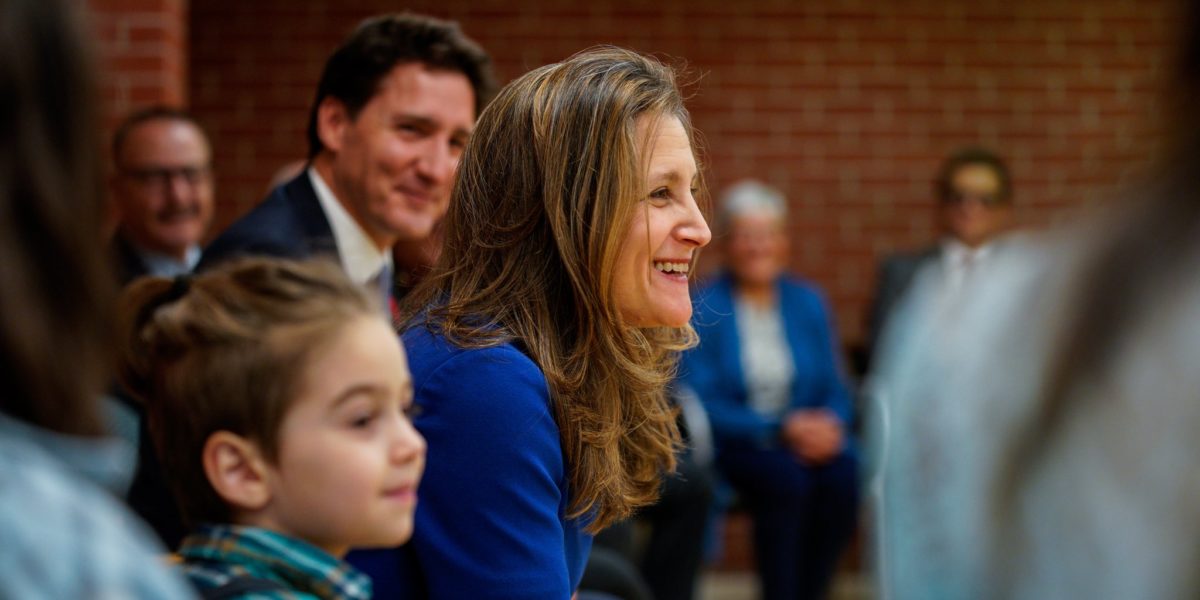Deputy Prime Minister and Minister of Finance Chrystia Freeland’s speech to the Brookings Institute on October 11 portrayed the Western world as uniquely benign and well-intentioned in its efforts to spread liberal democratic and capitalist values around the world. She called for “friend-shoring” to cut non-democratic states out of supply lines that service the “non-geographical West.” Canada must form relationships with states that share “our values” and obey “the rule of law.” The “in-between states”, those not part of the non-geographical West, must be appealed to but clear authoritarian states must be treated as opponents. Freeland recognized the need to cooperate with states that are “not like us” in order to manage the world’s greatest crises, like climate change, but keeping these states at arms-length is her prescription for the future.
There was a great deal that was wrong with Minister Freeland’s speech. The “in-between states” are really any states that will cooperate with the West in its efforts to contain its self-defined enemies. This is old-fashioned Cold War politics. Minister Freeland paid lip service to Canada’s brutal history with the First Nations, but her speech contained none of the humility that such an understanding should elicit. Instead, she condescendingly accorded the West the moral superiority to decide which states will be permitted to climb the economic ladder. She acknowledged Western history and, simultaneously, learned nothing from it.
Nonetheless, the worst part of Freeland’s speech was what she did not say. Freeland laid the blame for the end of 33 years of post-Cold War order and “optimism” on Russia’s invasion of the Ukraine on February 24. Incredibly, she completely disregarded the US invasion of Iraq in 2003. That act of American aggression and imperialism laid the groundwork for all that came later, including Russia’s attack on Ukraine. The War on Terror has since killed more than 900,000 people, destabilized the Middle East and normalized American drone attacks on the Muslim world. Somehow, Minister Freeland ignored all of this as she extolled the virtues of Western “values.” By doing this, she undermined everything she had to say.
RELATED: Freeland’s ‘new’ alliance more of same old pro-US policies
It is incomprehensible that Minister Freeland forgot the Americans’ illegal war, the most terrible blow against international law in the 21st century. Indeed, she even mentioned Iraq’s invasion of Kuwait; how could she forget the US invasion of Iraq? However, acknowledging that US aggression has shaped the past 20 years of world history spoils the self-serving narrative of a golden era disrupted by authoritarian states. Admitting that the Western world has been responsible for most of the international violence since the end of the Cold War could lend credence to Russia’s purported fear of NATO. It would mean recognizing that the “rule of law” is most often broken by the US.
The “in-between states” have lived with Western violence and hypocrisy for generations. They know how powerful Western states invoke the “rule of law” when it serves their interests and then violate that rule with impunity when it does not. They understand how trivial Western “values” really are when domination and control of other states are at stake. Most tragically, they are used to being ignored and spoken down to by people like Minister Freeland.
Freeland’s speech was an effort to secure Canada’s access to the US market. The US has turned against free trade and the liberal economic world order, where it cannot secure its continued hegemony. Freeland was responding to this American semi-isolationism by trying to convince the Americans to allow continued access to their “friends.” Canada’s economic dependency on the US is a source of profound weakness that has Canadian politicians endlessly prostrating themselves before American power, but that is the practical reality of our circumstances. Minister Freeland is only the most recent Canadian supplicant to American power. Sadly, she will not be the last. Ironically, the US commitment to the liberal democratic values that Minister Freeland set as the measure for cooperation remains extremely uncertain -but that was never really the point.
Freeland’s approach sows international division and locks Canada into a relationship with a declining superpower at the exact moment that Canada needs to expand its trade and political relations beyond North America. Canada can build bridges to the world. Instead, in Minister Freeland’s view, it should cater to parochialism. Hopefully, Freeland’s is not the last word on Canada’s foreign policy direction. We are still waiting for Global Affairs Minister Melanie Joly’s “Indo-Pacific Strategy”, which she has promised to release in December. Unfortunately, Minister Joly’s speech on November 9 seems to accord with much of Freeland’s position. If this is indicative of where Canada is going, then Canada is circumscribing a much smaller and meaner role for itself in world affairs.



